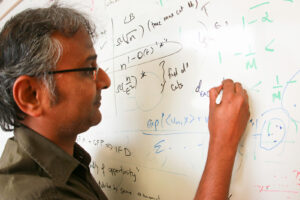 Whether it’s choosing the next movie we watch on Netflix or weeding out a group of job applicants, computers and the software that runs on them are becoming more powerful tools in society. That requires they be used responsibly and fairly.
Whether it’s choosing the next movie we watch on Netflix or weeding out a group of job applicants, computers and the software that runs on them are becoming more powerful tools in society. That requires they be used responsibly and fairly.
To teach computer science students the importance of ethics in their field, University of Utah School of Computing professor Suresh Venkatasubramanian has received a $150,000 grant from Mozilla, the makers of the Firefox web browser; as well as Omidyar Network; Schmidt Futures; and Craig Newmark Philanthropies. He and his team are one of 17 winners from the “Responsible Computer Science Challenge,” a $3.5 million competition to find ways to integrate ethics into computer science education in the nation’s universities. Mozilla announced the winners of the first stage of two stages.
“Today’s computer scientists write code with the potential to affect billions of people’s privacy, security, equality and well-being,” said Kathy Pham, computer scientist and Mozilla Fellow co-leading the Challenge. “Technology today can influence what journalism we read and what political discussions we engage with; whether or not we qualify for a mortgage or insurance policy; how results about us come up in an online search; whether we are released on bail or have to stay; and so much more.”
Venkatasubramanian’s winning curriculum will involve teaching students to apply problem-solving not only to algorithms but also to the societal issues that these algorithms attempt to address.
“We aim to create computer scientists who naturally consider issues such as sustainability, racism, and community impact alongside matters of data structure design and complexity,” he said. “We will do this by creating coding or problemsolving assignments that focus on a specific domain via partnerships with domain experts.”
Other recipients of the award who are working with Venkatasubramanian are Haverford College computer science assistant professor Sorelle Friedler and Brown University computer science associate professor Seny Kamara. Venkatasubramanian expects to start teaching these concepts as early as this fall.
“We’re in the middle of an unprecedented moment of introspection about the dangers of technology,” he said. “Students in computer science — the future builders of new technology — will benefit from getting a deeper understanding of the ethical and larger societal concerns around the technology that runs our lives.”
Click here for a list of this year’s winners and descriptions of their proposals.